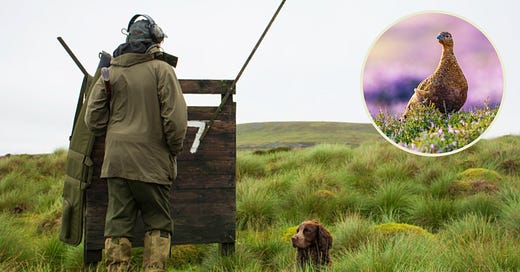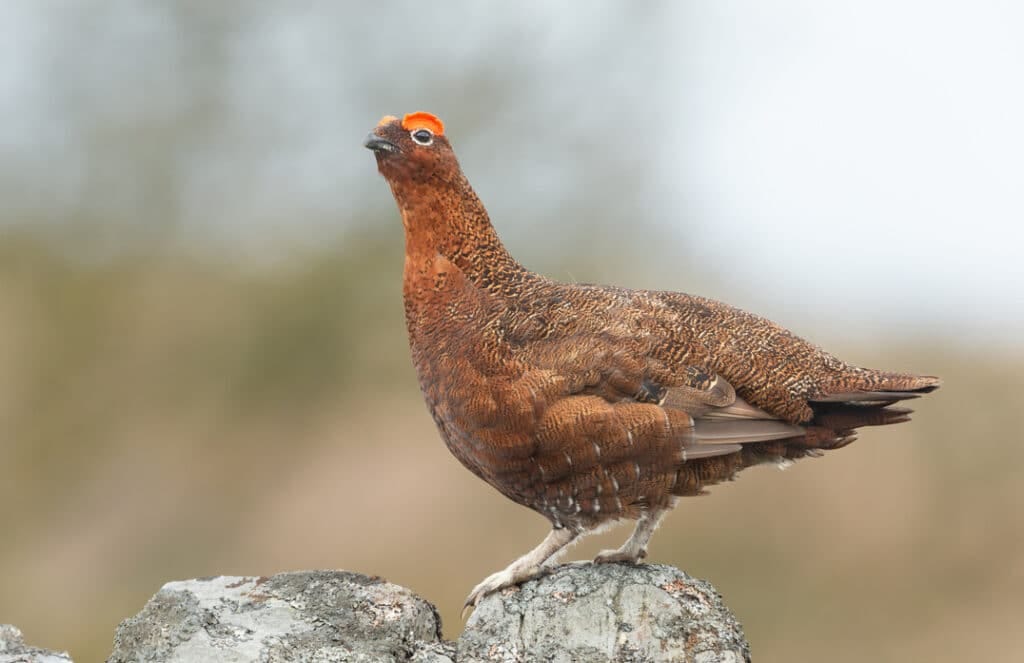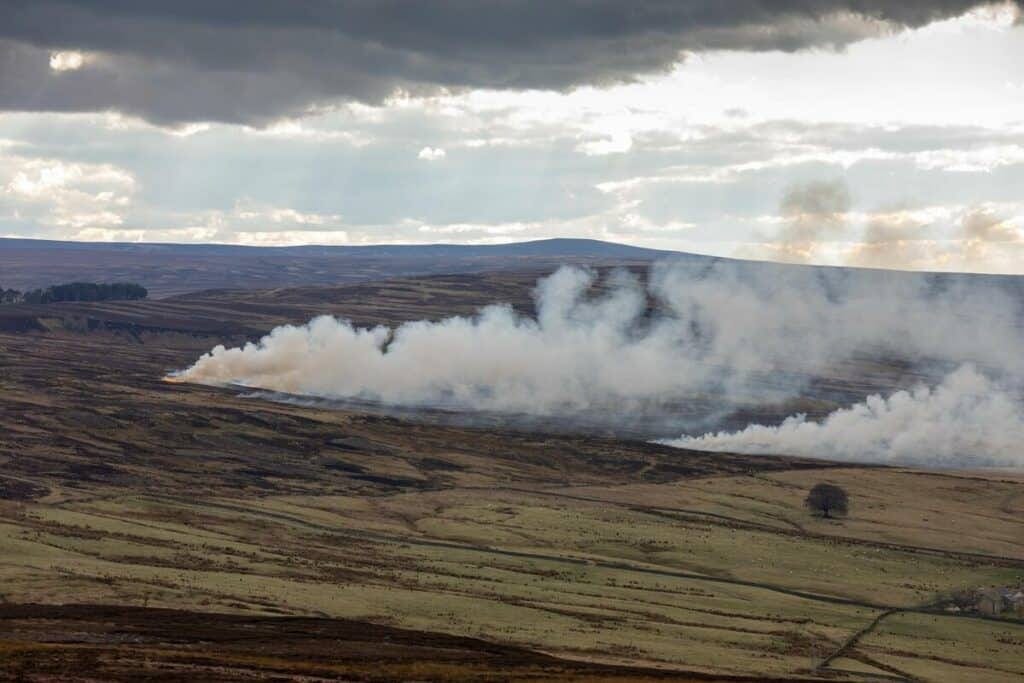As we reported on July 22nd, United Utilities (UU), the largest corporate landowner in England, announced its decision to no longer renew grouse shooting leases on its moorland. The last of those leases will end in 2027, after which time UU (unless they bow to pressure from the shooting industry) will be out of the grouse killing game forever.
It's good news (if you're not heavily invested in killing Red Grouse anyway). United Utilities owns and manages 56,000 hectares of land around its reservoirs, covering (they say) "some of the most vibrant and diverse natural environments in England". The moorlands it currently leases for grouse shooting include four areas in the Bowland AONB, Boulsworth Moor and Worsthorne Moor near Burnley, the Goyt Valley near Buxton, the Longdendale Valley near Glossop, and Anglezarke Moor near Chorley. Those water catchment moors - according to the campaign group Wild Moors which has worked for years to secure this decision - will be restored "for nature, climate and people".
Which is fantastic, but also a reminder that UU is of course a water company. With one of the worst environmental records in the UK.
Data published in March this year by the Environment Agency showed that UU discharged untreated sewage almost 70,000 times last year for a total of 425,491 hours. The Plumbland Waste Water Treatment Works in Cumberland did so for nearly 7,000 hours in 2022 – effectively around the clock. The company has made a fortune while polluting the region’s waterways. It reported operating profits of £610 million in 2022 and paid out dividends to its shareholders of £296 million.

UU is not suddenly one of the 'good guys' because it is halting grouse shooting.
Nevertheless, all and every step that breaks up an industry built on killing birds and underpinned by wildlife crime is to be warmly welcomed.
Wild Moors says that "conservation organisations have hailed this move by the company as a “breakthrough moment” that paves the way for the restoration of large parts of the Forest of Bowland, Peak District and West Pennines".
Most commenters appear to agree.
On, for example, the highly influential Raptor Persecution UK (a site that has done more to raise public awareness about the illegal killing of birds of prey on grouse moors than any other) some point out (as we have just done) that UU should not (yet anyway) be re-appraised as a symbol of environmental awareness and probity, but generally they agree that ending the killing of Red Grouse for fun and profit is long overdue.
The consensus across the board, in fact, seems to be that this decision, hopefully, will mark the beginning of the end for the grouse shooting industry and the bird of prey persecution that always comes with it.
The Countryside Alliance - lobbying for killing
Not quite everyone agrees of course.
The so-called 'Countryside Alliance' (CA), a dwindling band of bloodsports lobbyists chaired by Tim Bonner, 'think' (and we use the term loosely) differently.
In a wildly conjectural puff-piece in the Daily Telegraph, Bonner makes limp threats about how 'the countryside' will make UU regret its ''ill-thought-out distraction technique", which he claims with no evidence whatsoever "will inevitably backfire". Banning the killing of Red Grouse will be a disaster "for the conservation and biodiversity of our precious uplands" he shouts from the back of the hall long after most of the audience have already left...
It's nonsense, and what you'd expect from the Countryside Alliance of course.
Which does point to a certain consistency of messaging though. It may be claptrap, but we all know exactly where the so-called voice of the countryside stands when it comes to the slaughter of wildlife because it repeats the same message over and over again. It stands doggedly for the repeal of the Hunting Act, for snares and cage traps, for the gun over more legitimate concerns over crises in biodiversity and climate. The CA wants desperately to be the BFF of every man, woman, and child who gets their kicks pointing guns at other living beings or chases them with dogs.

But what do conservationists and campaigners want?
While it's clear that the CA will always and forever support a blood-soaked status quo, working out what conservationists and campaigners really want when it comes to grouse shooting is not quite so straightforward.
While there seems to be a majority welcome for a ban in this specific case, it comes largely from the same charities, organisations and individuals that have either explicitly distanced themselves from commenting on shooting unless wildlife crime is involved, or who have stated many times that grouse shooting can't (or even shouldn't) be banned outright.
Their proposal is that it should be licenced instead.
Licencing is an unfortunate halfway house being increasingly touted as a way of controlling the chaos and killing on grouse moors. It would, apparently, involve a shoot or an estate obtaining an operational licence from a regulator which would, at minimum, have conditions attached mandating the shoot follows wildlife and environmental protection codes of practice and laws. Where there is evidence suggesting that a shoot has failed to follow those conditions the licence can be withdrawn.
As we have stated before we are fundamentally opposed to a 'licencing lifeline' being offered to grouse moor owners.
It will legitimise the shooting industry and the slaughter of up to 500,000 Red Grouse every year. It essentially says that the ‘legal’ killing of countless numbers of foxes, corvids, stoats/weasels, and other native animals to support the industry is acceptable. Legislation already exists to protect birds of prey, yet they are being killed on grouse moors as a matter of routine: there are no guarantees of increased resources to ensure enforcement of 'licencing' conditions.
Licencing - in our opinion anyway - merely allows the grouse shooting industry to continue. It certainly does nothing at all for Red Grouse, like the one in the image below...
The shooting industry - between a rock and a hard place
The shooting industry, thankfully, finds itself in a difficult position when it comes to licencing. United Utilities' lease cessation decision only highlights that.
To keep themselves on United Utilities’ land, the industry could argue to UU that licencing would be a better option than an outright ban. That though would in effect be a call for licencing throughout the UK. Despite fearing that grouse shooting might be stopped completely as public sentiment turns ever more against it, the industry will never overtly support grouse moor licencing because (in crude terms) it loathes being told what it can and can not do.
The grouse killing industry is in fact coming under immense pressure from many directions. On top of long-standing issues around wildlife crime, water pollution, and the killing of so many birds and mammals, it is facing the reality that creating monocultures in sensitive habitats is now publically unacceptable (and leads to huge outbreaks of heather beetle and parasitic strongyle worms).
Urgent questions are routinely asked about whether large areas of blanket bog and heath (including on specially protected sites) should be intensively burned to maximise the number of grouse available for shooting (questions which have even led to recent legislation controlling burning).
Studies have revealed that for all the damage it causes (and for all the land it controls), grouse shooting contributes a minuscule amount to national economies: just 0.02% of Scotland's economy can be attributed to grouse shooting, for example.
Shoots struggling to 'produce' enough grouse to kill in changing climactic conditions on the moors are increasingly releasing non-native pheasants on lower slopes instead, putting the reality of birds being blown out of the air right in front of more and more unhappy walkers and tourists.
And despite the outrageous costs to kill grouse in the uplands (upwards of £2500/gun), grouse shoots typically make little profit.
Owners have started looking for alternative revenue streams, realising that there is more money to be made from using the peatlands as carbon storage offsets or green capital projects than for selling Red Grouse.
Guy Shrubsole discovered that 60% of England’s peatlands are owned by a small group of people. 249,000 hectares of peat are owned by 101 grouse moor estates. If UU can be turned - and the shooting industry knows this, hence the stink they're trying to create - then so can others.
If not now, when?
Whatever the reason behind UU's announcement not to renew shooting leases it is a cause for celebration.
The fact is that we are closer now than we have ever been to ridding the uplands of the scourge of grouse shooting.
Rewilding, eco-tourism, sustainable forestry, and carbon storage all look far more appealing and ethically acceptable than putting holes into wild birds for fun and money.
Yes, we also understand that by advocating against licencing we are contributing to the lack of that 'unified messaging' we are decrying, but we surely can't be alone in thinking that it makes even less sense to push for licencing when landowners like United Utilities have decided that supporting grouse shooting on its land is simply not worth the hassle and adverse publicity?







You keep saying I am a free subscriber to sub stack and I should upgrade to paid, but I already donate to you monthly. Does that not count?